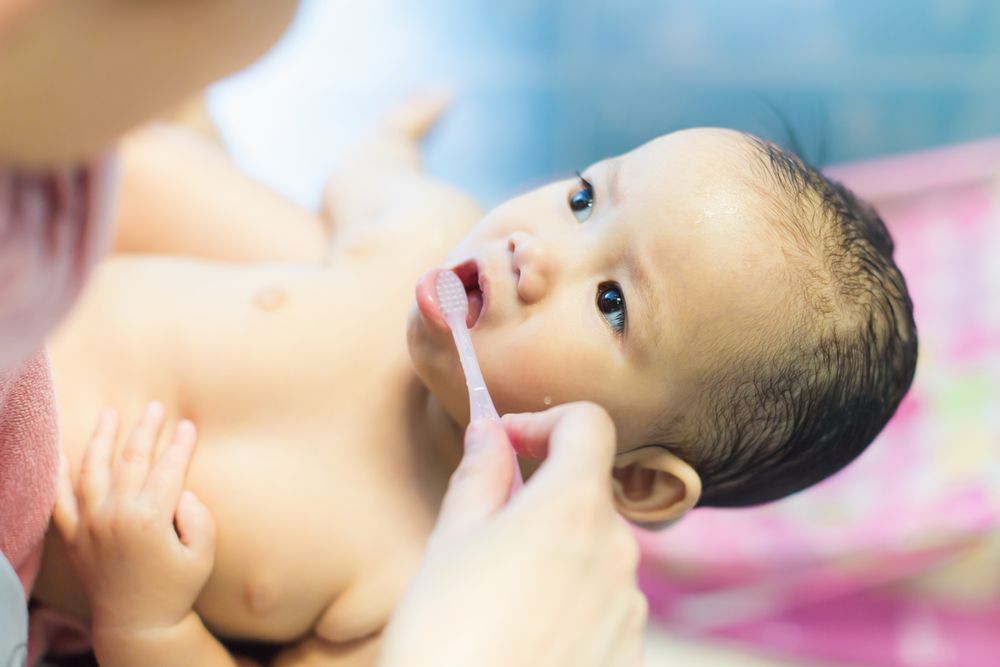How to keep baby teeth healthy
Published on Wednesday, 26 June 2019
Last updated on Tuesday, 31 December 2019

Baby teeth might not be around for the long haul, but they play a key role in developing your child's speech, saving space for their 'big teeth', growth of their jaw and face and, of course, chewing.
As soon as your bub sprouts their first tooth, it's important to keep it clean and healthy. Even tiny pearly whites are at risk of tooth decay, so let's look at some new research around dental health and brush up on how to care for your young child's teeth.
Is tooth decay genetic or preventable?
The good news is that tooth decay is preventable, and we are not born to have bad teeth. According to a recent study by the Murdoch Children's Research Institute, our genes don't make them more likely to have tooth decay - in fact, genetics have little impact on your dental health.
To reach this conclusion, Australian researchers looked at the teeth of 173 sets of twins, collecting their data from pregnancy through to the age of six, and found that even identical twins, with identical genomes, had different levels of decay.
Instead of blaming genetics for poor dental health, researchers say that, 'Environmental factors, like a lack of fluoride in water, seem to be the prime cause of cavities' and they stress the importance of children starting preventative measures early in life, before teeth are damaged.
The study also looked at early life risk factors, such as illness and lifestyle, and researchers did find a link between the mother's weight during pregnancy and her child's future dental health.
The offspring of obese mothers were more likely to have childhood tooth cavities, and lead researcher, Dr Mihiri Silva says, 'Perhaps the mother's weight has a biological influence on the developing foetus or perhaps the risk of decay rises because of increased sugar consumption in that household.'
What is the effect of childhood tooth decay?
Dr Silva describes tooth decay as a serious health problem, leading to thousands of preventable hospital stays for children, and says there is a clear link between child cavities and people developing diabetes and cardiovascular disease later in life. Poor teeth can also affect people's confidence, cause pain and take the pleasure out of eating chewy or crunchy foods.
For these reasons, it's important that parents, child-carers and health professionals promote good dental health at home and elsewhere in children's lives.
How can you protect your young child's smile?
In this country, children receive free basic dental care from birth until they turn 18 and it's just a matter of enrolling them in a Community Oral Health Service at birth or soon after. As part of the Well Child Tamariki Ora programme a nurse will also perform oral health checks on your child from birth to school age.
At home, you should focus on good habits and a great diet. Low-sugar food and drinks are important because tooth decay happens when mouth bacteria feed on sugar, then produce acid that erodes teeth.
With this in mind, the Ministry of Health says that 'healthy teeth = a healthy smile' and here are the five steps they recommend to protect your youngster's smile, whether they're a baby, toddler or preschooler:
- Brush teeth twice a day - after breakfast and before bed
- Have regular dental check-ups - to enrol with an oral health service or make an appointment, call 0800 TALK TEETH (0800 825 583)
- Lift the lip every month to check for signs of tooth decay
- Choose healthy snacks - fruit, fresh vegetables and yoghurt
- Drink water or plain milk rather than fruit juice, cordial and chocolate milk
When it comes to timing, you should start brushing each baby tooth as soon as it pops through the gum, and the New Zealand Dental Association has tips for how to clean little peoples' pearly whites.
It's recommended that you use a small, soft toothbrush and a smear of regular-strength fluoride toothpaste. According to HealthEd, fluoride strengthens growing teeth and can help fix the very early stages of tooth decay, so it's a modern marvel for children's mouths.
Remember too, that healthy baby teeth usually mean healthy adult teeth, so whether your infant has one toothy-peg or your three-year-old has a set of 20, good oral care in the early years is definitely something to smile about.
Related Articles

The ins and outs of toilet-training
Why waiting for the signs that your child is ready to start toilet training can speed the process.

How to assemble a healthy lunch box
Good food is essential for the healthy growth and development of young children. Toddlers and preschoolers can be a picky bunch so it's important to get nutritious meals into them.

Is there too much sugar in baby food?
Why World Health Organization (WHO) reckons commercial baby foods aren't quite as healthy as they're cracked up to be.
